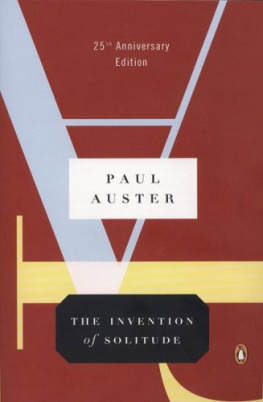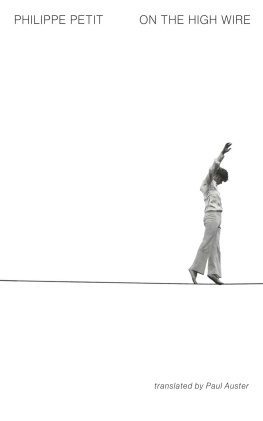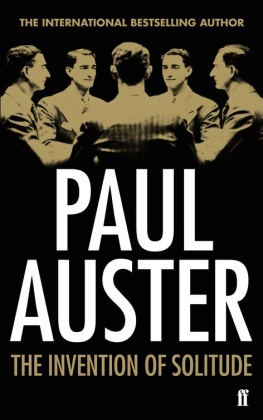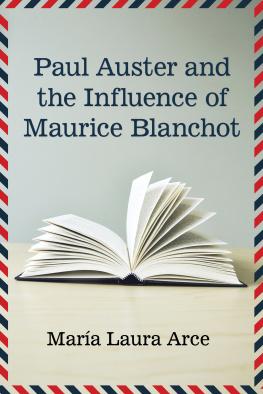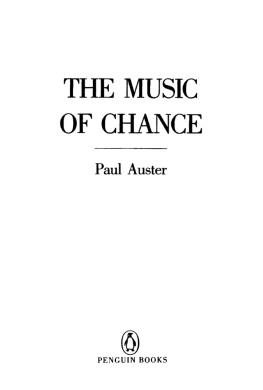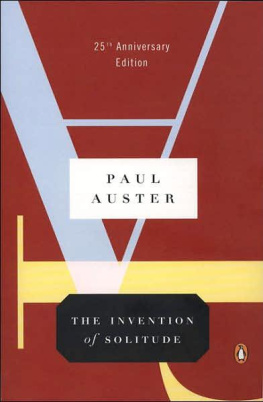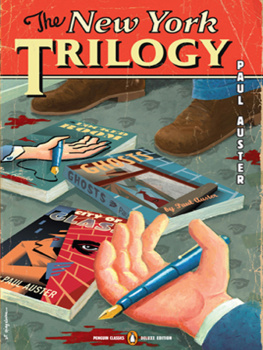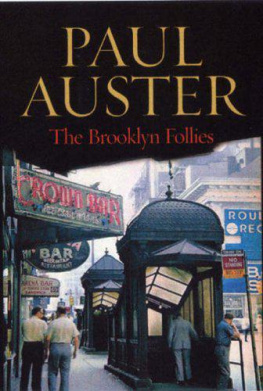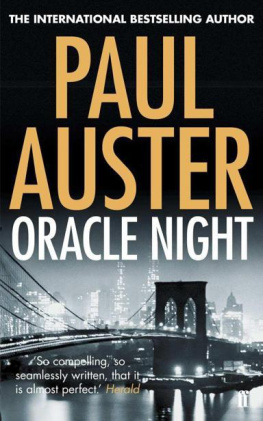Conversations with Paul Auster
Literary Conversations Series
Peggy Whitman Prenshaw
General Editor
Conversations with Paul Auster
Edited by James M. Hutchisson

www.upress.state.ms.us
The University Press of Mississippi is a member of the Association of American University Presses.
Copyright 2013 by University Press of Mississippi
All rights reserved
Manufactured in the United States of America
First printing 2013
Library of Congress Cataloging-in-Publication Data
Auster, Paul, 1947
Conversations with Paul Auster / edited by James M. Hutchisson.
p. cm.
Includes index.
ISBN 978-1-61703-736-8 (cloth : alk. paper) ISBN 978-1-61703-737-5 (ebook) 1. Auster, Paul, 1947Interviews. 2. Authors, American20th centuryInterviews. 3. Motion picture producers and directorsUnited StatesInterviews. I. Hutchisson, James M.
PS3551.U77Z46 2013
813.54dc23 2012021648
British Library Cataloging-in-Publication Data available
Works by Paul Auster
Fiction
City of Glass (Los Angeles: Sun and Moon Press, 1985)
Ghosts (Los Angeles: Sun and Moon Press, 1986)
The Locked Room (Los Angeles: Sun and Moon Press, 1986)
(Republished in one volume as The New York Trilogy [London: Faber and Faber, 1987; NY: Penguin, 1990])
In the Country of Last Things (NY: Viking, 1987)
Moon Palace (NY: Viking, 1989)
The Music of Chance (NY: Viking, 1990)
Leviathan (NY: Viking, 1992)
Mr. Vertigo (NY: Viking, 1994)
Timbuktu (NY: Holt, 1999)
The Book of Illusions (NY: Holt, 2002)
Oracle Night (NY: Holt, 2003)
Auggie Wrens Christmas Story (NY: Holt, 2004)
The Brooklyn Follies (NY: Holt, 2005)
Travels in the Scriptorium (NY: Holt, 2006)
Man in the Dark (NY: Holt, 2008)
Invisible (NY: Holt, 2009)
Sunset Park (NY: Holt, 2010)
Poetry
Unearth (Weston, CT: Living Hand 3, Spring 1974)
Wall Writing (Berkeley, CA: The Figures, 1976)
Effigies (Paris: Orange Export Ltd., 1977)
Fragments from Cold (Brewster, NY: Parenthse, 1977)
White Spaces (Barrytown, NY: Station Hill, 1980)
Facing the Music (Barrytown, NY: Station Hill, 1980)
Disappearances: Selected Poems (Woodstock, NY: Overlook Press, 1988)
Ground Work: Selected Poems and Essays 1970-1979 (London: Faber and Faber, 1991)
Autobiography of the Eye (Portland, OR: Beaverdam Press, 1993)
Collected Poems (Woodstock, NY: Overlook Press, 2004)
Essays, memoirs, and autobiographies
The Invention of Solitude (NY: SUN, 1982)
The Art of Hunger: Essays, Prefaces, Interviews (Los Angeles: Sun & Moon Press, 1992)
The Red Notebook and Other Writings (London: Faber and Faber, 1995)
Why Write? (Providence, RI: Burning Deck, 1995)
Hand to Mouth: A Chronicle of Early Failure (NY: Holt, 1997)
The Red Notebook: True Stories (NY: New Directions, 2002)
The Story of My Typewriter, with paintings and drawings by Sam Messer (NY: D.A.P., 2002)
Collected Prose: Autobiographical Writings, True Stories, Critical Essays, Prefaces, and Collaborations with Artists (NY: Picador, 2005; expanded second edition, 2010)
Winter Journal (NY: Holt, 2012)
Edited collections
The Random House Book of Twentieth-Century French Poetry: With Translations by American and British Poets (NY: Random House, 1982)
I Thought My Father Was God, and Other True Tales from NPRs National Story Project (NY: Holt, 2001); (British edition: True Tales of American Life [London: Faber and Faber, 2002])
Samuel Beckett: The Grove Centenary Edition (NY: Grove Press, 2006)
Selected Translations
A Little Anthology of Surrealist Poems (NY: Siamese Banana Press, 1972)
Fits and Starts: Selected Poems of Jacques Dupin (Weston, CT: Living Hand, 1973)
The Uninhabited: Selected Poems of Andr du Bouchet (NY: Living Hand, 1976)
Life/Situations: Essays Written and Spoken, by Jean-Paul Sartre (NY: Pantheon, 1977) (with Lydia Davis)
African Trio: Talatala, Tropic Moon, Aboard the Aquitaine, by Georges Simenon (NY: Harcourt, 1979) (with Lydia Davis)
A Tomb for Anatole, by Stphane Mallarm (San Francisco: North Point Press, 1983; rpt. NY: New Directions, 2005)
The Notebooks of Joseph Joubert (San Francisco: North Point Press, 1983; rpt. NY: New York Review Books, 2005)
Vicious Circles: Two Fictions and After the Fact, by Maurice Blanchot (Barrytown, NY: Station Hill, 1985)
Joan Miro: Selected Writings and Interviews (Boston: G. K. Hall, 1986)
Chronicle of the Guayaki Indians by Pierre Clastres (NY: Zone Books, 1998)
Filmography
Smoke (1995)
Blue in the Face (1995)
Lulu on the Bridge (1998)
[In Three Films: Smoke, Blue in the Face, and Lulu on the Bridge (NY: Picador, 2003)]
The Inner Life of Martin Frost (NY: Picador, 2007)
Collected Screenplays (London: Faber and Faber, 2010)
Contents
Stephen Rodefer / 1985
Joseph Mallia / 1987
Larry McCaffery and Sinda Gregory / 1989
Mark Irwin / 1992
Annette Insdorf / 1994
Michel Contat / 1994
Ashton Applewhite / 1994
Stephen Capen / 1996
Rebecca Prime / 1998
Carole Burns / 2003
Michael Wood / 2003
The Believer / 2005
Mary Morris / 2005
Cline Curiol / 2006
Greg LaGambina / 2008
Juliet Linderman / 2009
Nick Obourn / 2010
Introduction
Paul Auster has granted a lot of interviews, more so perhaps than most contemporary writers and most writers like Auster, who seems to present a persona to the public of a brooding, philosophical artist, so devoted to his art as to be willingly cut off from the world. When one questioner in 2003 asked him if hed prefer just to stay locked away somewhere and write, he responded that he would rather not say a word to anybody but that he felt an obligation to his publisher to present [his] book[s] to the public. Yet by his own account he has been interviewed hundreds of times, and the number has risen sharply as he has advanced in his career and become one of the most prolific, critically acclaimed, and intensely studied of living American writers. In the words of one critic, he has given the phrase experimental fiction a good name by fashioning bona fide literary works with all the rigor and intellect demanded of contemporary literature.
Auster was born in Newark, New Jersey in 1947, attended Columbia University during the 1960s and graduated with both a bachelors and masters degree in comparative literature. In the 1970s, Auster lived variously in Paris and southern France earning a meager living as a freelance reviewer and translator. His first major book, The Invention of Solitude (1982) was a memoir, an account of his relationship with his father, but he became known quickly as a novelist in 1985 when
Next page

